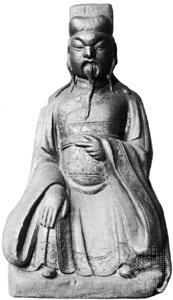Ch'eng Huang
Chinese deity
Pinyin Cheng Huang
 (Chinese: “Wall and Moat”), in Chinese mythology, the spiritual magistrate and guardian deity of Chinese cities. Because dead spirits reputedly informed the god of all good and evil deeds within his jurisdiction, it was popularly believed that devout prayers offered in Ch'eng Huang's temple would be liberally rewarded. The wide popularity of his cult was also due in part to imperial approbation. In 1382 his temples were appropriated by the government, and people were directed to offer sacrifices to the protector of their city.
(Chinese: “Wall and Moat”), in Chinese mythology, the spiritual magistrate and guardian deity of Chinese cities. Because dead spirits reputedly informed the god of all good and evil deeds within his jurisdiction, it was popularly believed that devout prayers offered in Ch'eng Huang's temple would be liberally rewarded. The wide popularity of his cult was also due in part to imperial approbation. In 1382 his temples were appropriated by the government, and people were directed to offer sacrifices to the protector of their city.Traditionally, before assuming a new post, local officials used to pass the night in Ch'eng Huang's temple seeking guidance. When difficult problems of law later presented themselves, officials returned to the temple, in hopes that Ch'eng Huang would reveal the answer in a dream.
When a death occurred, relatives or close friends of the deceased visited Ch'eng Huang's temple to report the fact so that records could be kept up to date. Once or twice a year the deity's figure was carried through the city streets on a tour of inspection. He was preceded by assistants, among whom were a tall figure in black (Hei Lao-yeh) and a short figure in white (Pai Lao-yeh) who watched over the city night and day.
T'ang dynasty (618–907) officials, wishing to enhance the prestige of Chinese gods, provided Ch'eng Huang, as well as other gods, with an ancient lineage. He was thus identified with Shui Jung (their names mean the same), one of the Eight Spirits to whom Emperor Yao is said to have offered sacrifice in prehistoric times. Actually, there is no mention of Ch'eng Huang in Chinese literature until the 6th century AD.
In practice, a Ch'eng Huang was often a deceased local official who had been deified because he served his community with distinction in bygone days. It was possible for a city to change the identity of its local Ch'eng Huang by simply forgetting the old god and welcoming a new protector to the existing temple with a joyous celebration.
- Humbert I
- Humbert of Silva Candida
- Humboldt
- Humboldt, Alexander von
- Humboldt Glacier
- Humboldt River
- Humboldt University of Berlin
- Humboldt, Wilhelm, Baron von
- Hume, Alexander
- Hume, Allan Octavian
- Hume Cronyn
- Hume, David
- Hume, Hamilton
- Hume, John
- Hume, Joseph
- Hume Reservoir
- Hume-Rothery, William
- humerus
- Hume, Sir Patrick, 2nd Baronet
- Humfrey, Pelham
- Humfry Payne
- humic acid
- humidity
- humite
- Hummel, Johann Nepomuk